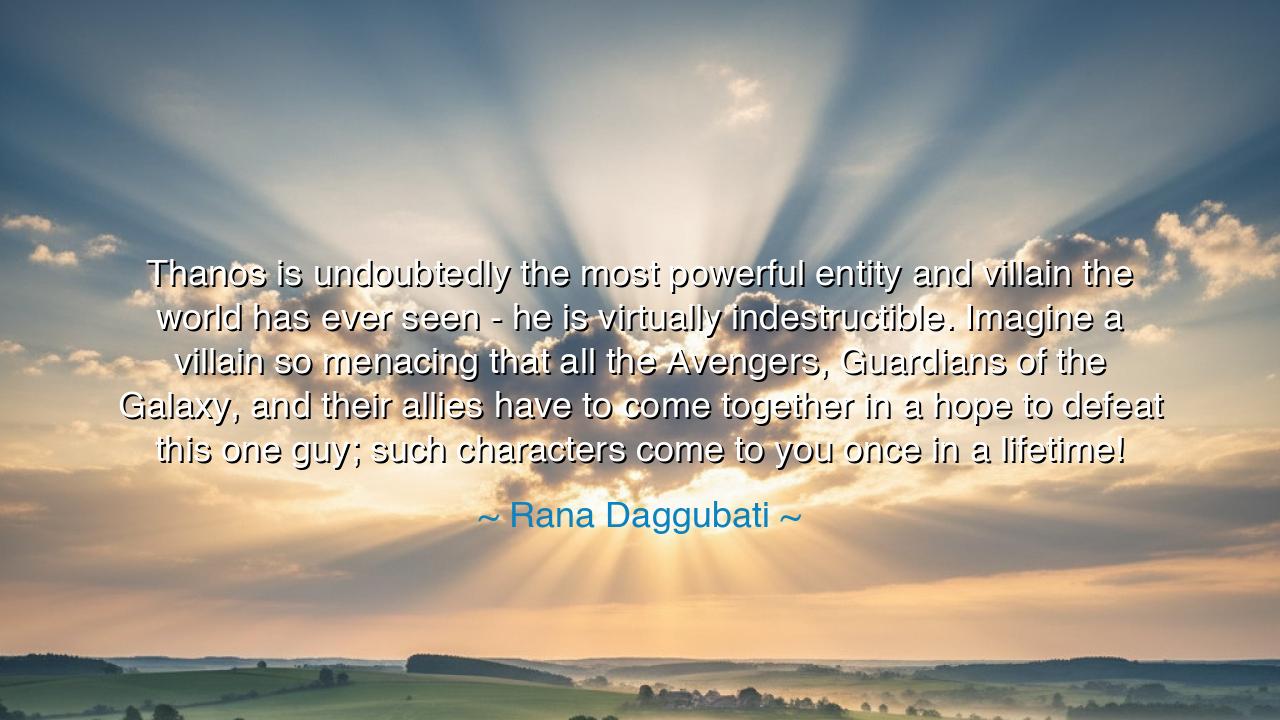
Thanos is undoubtedly the most powerful entity and villain the
Thanos is undoubtedly the most powerful entity and villain the world has ever seen - he is virtually indestructible. Imagine a villain so menacing that all the Avengers, Guardians of the Galaxy, and their allies have to come together in a hope to defeat this one guy; such characters come to you once in a lifetime!






“Thanos is undoubtedly the most powerful entity and villain the world has ever seen – he is virtually indestructible. Imagine a villain so menacing that all the Avengers, Guardians of the Galaxy, and their allies have to come together in a hope to defeat this one guy; such characters come to you once in a lifetime!” Thus spoke Rana Daggubati, himself a man who has breathed the fire of cinema and myth, giving voice to the awe that heroes—and audiences—feel before the shadow of a truly great adversary. His words, though born of a tale told on screen, reach beyond fiction. They speak to the eternal struggle between light and darkness, unity and destruction, and to the truth that even in our stories, the strength of the hero is measured only by the power of the villain who stands against him.
In every age, mankind has told tales of beings like Thanos—creatures of immense strength, whose purpose is both terrifying and strangely noble. To the ancients, he would have been likened to Kronos, who devoured his own children to defy fate, or to Lucifer, who fell from heaven in pursuit of power. Such figures are not born merely to terrify—they exist to test humanity, to force mortals and gods alike to discover the limits of their courage. When Rana Daggubati calls Thanos a “once in a lifetime” character, he speaks not of rarity in art alone, but of rarity in the soul. For such figures remind us that to face the infinite darkness, mankind must unite, must transcend difference, and must rise beyond fear.
Thanos, the Mad Titan, is the embodiment of inevitability—his goal not chaos, but balance. He believes that mercy lies in destruction, that salvation can be forged through death. This is what makes him more than a monster; he is conviction given form. In him, we see reflected the darker side of human reason—the dangerous belief that righteousness justifies cruelty. Rana Daggubati, in recognizing Thanos’ power, honors not merely his might, but his complexity. A villain who believes he is right is far more perilous than one who knows he is wrong. For such a foe fights not for conquest, but for destiny—and to stand against him requires more than strength; it requires the wisdom to see through the illusion of power.
Throughout history, the world has known real men who bore the spirit of Thanos—Genghis Khan, whose armies swept across continents in the name of unification; Napoleon Bonaparte, whose vision of empire consumed nations; Adolf Hitler, whose belief in order through destruction brought humanity to its darkest hour. These were not mere tyrants; they were embodiments of obsession—the same fire that burned within the Titan’s heart. And yet, as in the tale of the Avengers, such power could only be undone when men and women set aside pride, borders, and fear to fight for life itself. Thus, fiction and history entwine to teach the same lesson: that evil’s greatest weapon is division, and its greatest weakness is unity.
When Daggubati calls Thanos “virtually indestructible,” he speaks to more than physical might. He speaks of the immortality of ideas. For even when such villains fall, their shadow lingers. The world continues to wrestle with their echoes—the hunger for control, the temptation of power, the delusion of self-righteousness. Yet this is precisely why such figures are necessary. Without the darkness of Thanos, the light of the Avengers would not shine so brightly. Without the trial, there can be no triumph. The presence of the indestructible villain is the crucible in which heroes are forged.
And so, the ancients would have said: fear not the tyrant, but fear a world too weak to oppose him. The villain’s strength is not his destruction, but our complacency. Thanos reminds us that even gods can fall prey to the illusion of control, and even mortals can rise to defy destiny. In his defeat, not through a single warrior but through the combined will of many, lies a truth as old as time: only unity conquers the unconquerable.
Thus, my friends, the lesson of Daggubati’s reflection is this: cherish your adversaries, for they reveal your true measure. Do not curse the darkness—gather your allies and bring forth light. When life presents you with your own “Thanos”—be it failure, fear, or despair—remember that no power, however vast, is beyond the reach of courage joined with purpose. Strength alone cannot defeat evil, but the spirit of togetherness, the harmony of hearts, can move mountains and unmake even Titans.
For as Rana Daggubati reminds us, such figures come but once in a lifetime—not to destroy us, but to awaken us. The villain, in his grandeur, teaches us the boundlessness of our own potential. And when we rise, united and unafraid, we prove to Heaven and Earth alike that the will of the good, when joined as one, is mightier than any infinity stone, any empire, any shadow that dares to stand against the light.






AAdministratorAdministrator
Welcome, honored guests. Please leave a comment, we will respond soon